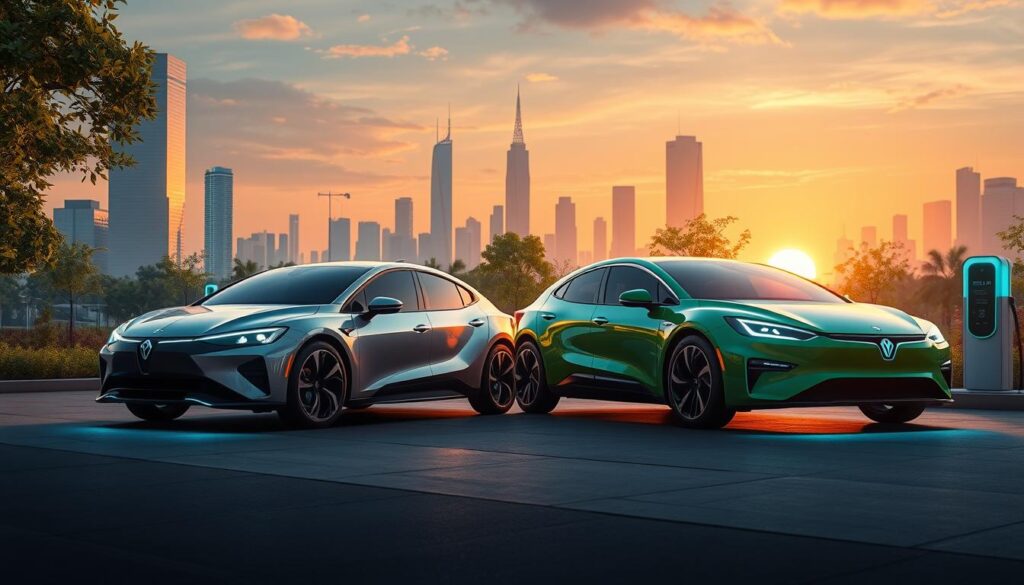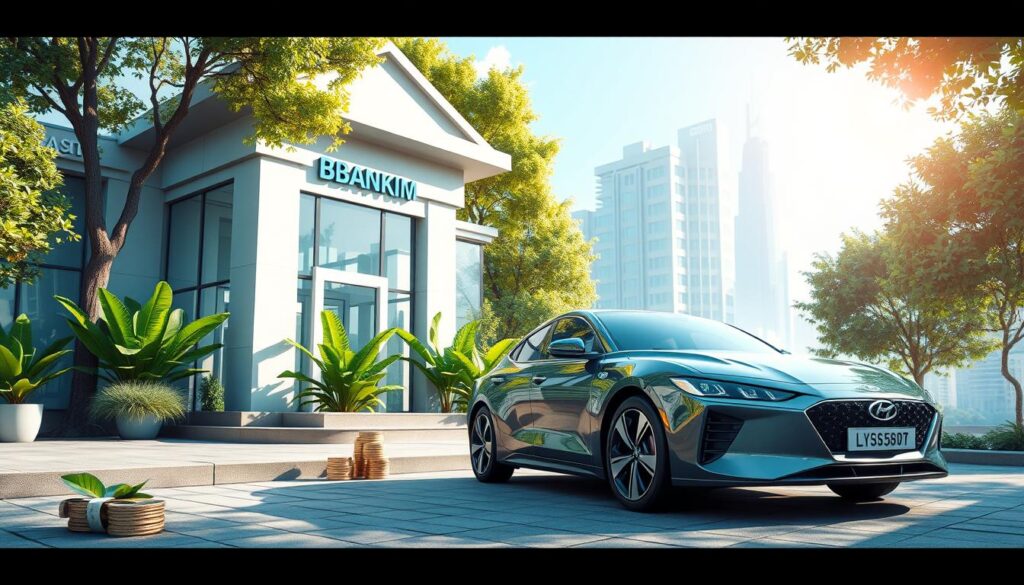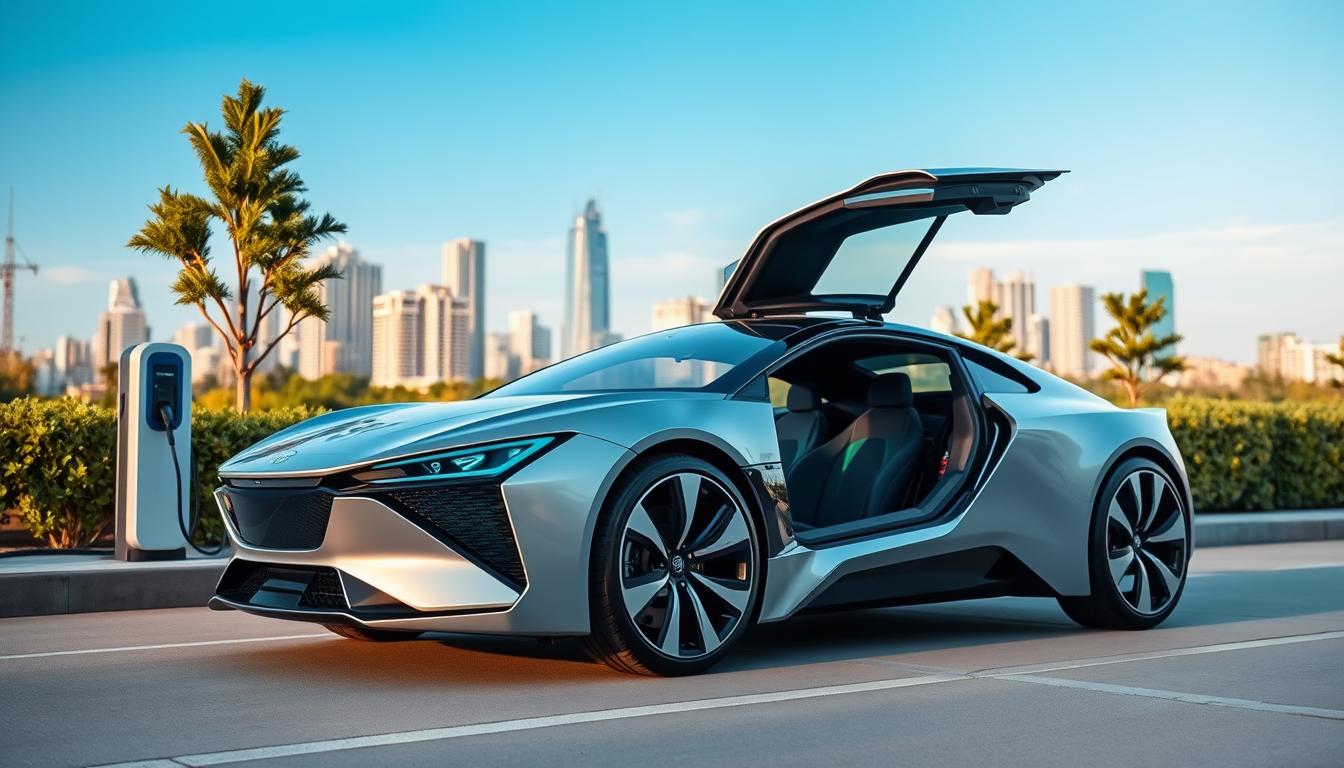Did you know that hybrid cars have surged in popularity, with nearly 7 million sold worldwide as of 2022? As drivers become more eco-conscious and seek fuel-efficient cars, the demand for hybrid vehicle technology continues to grow. In 2023, hybrid vehicles stand out not just for their environmental benefits, but also for their impressive performance and cost savings. This article explores the multifaceted world of hybrid cars, helping you navigate the pros and cons while highlighting some of the top models available today.
Key Takeaways
- Hybrid cars blend traditional and electric power for improved fuel efficiency.
- They contribute significantly to reducing carbon emissions.
- Hybrids often come with tax incentives and rebates for buyers.
- Despite their advantages, they may have a higher initial purchase price.
- Understanding the differences between hybrid and electric cars is essential for informed decisions.
- Consumer choices and technological advancements are shaping the future of hybrid vehicles.
What Are Hybrid Cars?
Hybrid cars signify a pivotal leap in automotive innovation, marrying traditional internal combustion engines with electric motors. This synergy enhances fuel efficiency and diminishes emissions, appealing to environmentally aware consumers. Grasping the nuances of various hybrid types empowers potential buyers to select the most suitable model for their requirements.
Definition and Types of Hybrid Cars
A hybrid car is characterized by its utilization of multiple power sources for propulsion. The prevalent hybrid categories encompass:
- Mild Hybrids: These vehicles employ a small electric motor to augment engine performance during acceleration, yet cannot operate solely on electric power.
- Full Hybrids: Full hybrids can propel solely on electric power, the internal combustion engine, or a synergy of both.
- Plug-in Hybrids: These cars boast larger batteries, enabling them to be charged from an external power source, thereby extending their electric-only driving capabilities.
How Hybrid Cars Work
The operational efficiency of hybrid cars stems from their pioneering application of hybrid vehicle technology. The synergy between electric motors and internal combustion engines optimizes performance and power delivery, contingent upon driving conditions. Essential components of this technology include:
- Regenerative Braking: This feature captures energy typically dissipated during braking and converts it into electrical energy, replenishing the vehicle’s battery.
- Battery Systems: Hybrid cars leverage advanced battery packs to store and supply energy for electric propulsion, thereby augmenting overall fuel efficiency.
As the quest for sustainable transportation intensifies, hybrid cars remain at the forefront of innovation, addressing escalating fuel economy benchmarks. The allure of hybrid vehicle technology may pique the interest of those seeking a greener driving experience.
Benefits of Driving Hybrid Cars
The decision to opt for a hybrid vehicle is a strategic move, appealing to those who prioritize environmental stewardship and fiscal prudence. The array of advantages, from cost-effective fuel consumption to ecological benefits, solidifies hybrid cars as a preferred choice for many. This selection is not merely a trend but a thoughtful commitment to sustainability and economic efficiency.
Fuel Efficiency and Cost Savings
Hybrid cars stand out for their superior fuel efficiency, a trait that sets them apart from conventional vehicles. By integrating internal combustion engines with electric motors, these cars achieve remarkable fuel economy. This results in substantial savings for owners, particularly in the face of escalating fuel costs. The hybrid car benefits are thus magnified, offering a practical solution to extend the life of one’s fuel budget.
Environmental Impact
The environmental advantages of hybrid cars are equally compelling. With lower carbon emissions compared to traditional vehicles, they play a crucial role in mitigating pollution and climate change. By embracing hybrid technology, drivers actively contribute to a cleaner, healthier planet. This commitment to sustainability is a testament to the forward-thinking nature of hybrid car adoption.
Tax Incentives and Rebates
Government initiatives further incentivize the adoption of hybrid vehicles through tax incentives and rebates. These financial benefits can substantially reduce the upfront cost of a hybrid, making it a financially astute choice. State and federal programs alike offer these incentives, fostering a shift towards more sustainable transportation options. This synergy between fiscal benefits and environmental responsibility underscores the value of hybrid cars in modern society.
Potential Drawbacks of Hybrid Cars
Hybrid cars, while offering numerous advantages, also present certain drawbacks that prospective buyers must consider. A comprehensive understanding of these hybrid car drawbacks is crucial for making an informed decision regarding vehicle acquisition.
Higher Initial Purchase Price
The elevated initial purchase price of hybrid vehicles is a significant concern for potential buyers. Compared to conventional gas-powered automobiles, hybrids often command a premium. This increased cost acts as a deterrent for those seeking more affordable options. The technological advancements by manufacturers contribute to these elevated prices, yet they may lead to long-term savings through enhanced fuel efficiency.
Maintenance and Repair Costs
Hybrid vehicle maintenance is another critical factor to consider before making a purchase. Although hybrids generally require less frequent servicing than traditional cars, specific aspects necessitate specialized care. The need for mechanics with specialized training to handle hybrid systems can result in higher repair costs. It is imperative for owners to verify the capabilities of local mechanics to ensure reliable servicing. For further information, readers can explore hybrid vehicle maintenance details.
Battery Life Concerns
Battery life is a paramount concern for many prospective hybrid owners. The battery’s longevity can significantly influence overall ownership costs. While manufacturers typically offer warranties, a replacement may be necessary after several years, which can be prohibitively expensive. It is essential to research battery life specifications when considering a hybrid model. A thorough understanding of the long-term implications of battery life is crucial for ensuring a sound investment.
Top Hybrid Car Models of 2023
In our exploration of hybrid car models for 2023, certain models emerge as exemplary due to their distinctive attributes and widespread appeal. This year’s lineup showcases the pinnacle of reliability, efficiency, and aesthetic appeal within the hybrid automotive sector.
Toyota Prius: A Classic Choice
The Toyota Prius remains a leading figure in hybrid car reviews, celebrated for its unparalleled fuel efficiency. It provides an eco-conscious driving experience, ensuring comfort is not compromised. Its unique design and cutting-edge technology solidify its status as a preferred choice for those desiring a dependable and forward-thinking vehicle.
Honda Accord Hybrid: Merging Style and Efficiency
The Honda Accord Hybrid captivates those who prioritize style and practicality. It offers a spacious interior and a dynamic driving experience, eschewing performance sacrifices. Its sophisticated design and potent engine cement its reputation as a premier hybrid model.
Ford Escape Hybrid: Versatility in an SUV
The Ford Escape Hybrid distinguishes itself as a compact SUV that seamlessly blends versatility with environmental consciousness. Its expansive cargo capacity and state-of-the-art safety features cater to families and thrill-seekers. This model exemplifies the seamless integration of hybrid technology, balancing practicality with efficiency.
How to Choose the Right Hybrid Car for You
The task of selecting a hybrid car appears daunting, given the multitude of choices. It is crucial to begin by examining your driving habits, as they are pivotal in identifying the most suitable option. Reflect on your daily travel distances, the nature of your routes, and the occurrence of extended journeys. This reflection will assist in choosing hybrid cars that resonate with your daily routine.
Assessing Your Driving Habits
Grasping the intricacies of your driving habits is fundamental in streamlining your selection process. Consider the following:
- Average daily commute distance
- Frequency of long road trips
- Urban vs. rural driving conditions
For example, individuals with extensive daily commutes may find hybrids with superior fuel efficiency more advantageous. Conversely, those embarking on frequent weekend excursions should prioritize models with ample fuel capacity or increased cargo capacity.
Features to Consider
Diverse models offer a range of features. Identifying the most critical can facilitate a more informed hybrid car comparison. Essential features to scrutinize encompass:
- Trunk space for your needs
- Seating capacity for family or friends
- Technology options such as connectivity and safety systems
By meticulously evaluating these features, you can pinpoint models that align with your specific needs. For a more comprehensive resource, refer to this buying guide for hybrids.
Hybrid Cars vs. Electric Cars

In the realm of automotive innovation, the distinction between hybrid cars and electric vehicles is paramount. Each category presents a unique set of benefits, tailored to diverse consumer preferences and requirements. Grasping these disparities is crucial for making well-informed choices, predicated on one’s driving patterns and lifestyle.
Key Differences Explained
Hybrid cars integrate conventional gasoline engines with electric powertrains, achieving a harmonious blend of fuel efficiency and performance. Conversely, electric vehicles rely exclusively on electric power, thereby eliminating emissions. The following elucidates the primary distinctions:
- Fuel options: Hybrid cars leverage both gasoline and electricity, affording greater flexibility in fuel accessibility.
- Range: Hybrids generally boast a longer driving range, courtesy of their gasoline engine, mitigating the range anxiety prevalent in electric vehicles.
- Charging infrastructure: Electric vehicles necessitate access to charging stations, whereas hybrids can utilize existing gas stations, enhancing their suitability for extended journeys.
Benefits of Each Type
Both hybrid and electric options present a plethora of advantages. Below are some key highlights:
- Hybrid cars:
- Typically exhibit lower upfront costs compared to electric vehicles.
- Offer an extended driving range, courtesy of their dual power sources.
- Electric vehicles:
- Feature significantly lower operating costs, with minimal moving parts.
- Contribute to cleaner air and a reduced carbon footprint, given their absence of tailpipe emissions.
The Future of Hybrid Technology
The realm of hybrid vehicle technology is on the cusp of a profound metamorphosis. Anticipated breakthroughs herald a new era of heightened efficiency and ecological consciousness, resonating with an expanding demographic. As the imperative for greener mobility options intensifies, grasping these forthcoming advancements becomes imperative.
Innovations on the Horizon
Emerging trends in hybrid technology herald a paradigm shift towards:
- Advanced battery designs: Novel configurations and materials will elevate energy storage capabilities and expedite recharging processes.
- Eco-friendly materials: The integration of sustainable components in hybrid vehicle construction will drastically reduce ecological footprint.
- Smart hybrid systems: Sophisticated software enhancements will dynamically optimize performance and fuel economy in response to real-time driving scenarios.
Market Trends and Consumer Preferences
Present market dynamics underscore a pronounced inclination towards hybrid vehicles. Key drivers of this trend encompass:
- An escalating focus on environmental stewardship among consumers.
- The broadening availability of hybrid models across diverse vehicle categories.
- Competitive financing schemes and governmental incentives encouraging eco-conscious selections.
The trajectory of hybrid cars appears auspicious. These evolving trends and innovations foretell a future where the automotive sector gravitates towards more efficacious and eco-responsible mobility solutions, ushering in a pivotal era in automotive evolution.
The Role of Government Policies in Hybrid Car Adoption
Government policies play a pivotal role in the adoption of hybrid cars, acting as a bridge between technological innovation and consumer accessibility. Through the provision of incentives, these policies directly target buyers, encouraging a shift towards more environmentally friendly vehicles.
Incentives for Buyers
Attractive buyer incentives are a major draw for consumers considering hybrid cars. These incentives, which include tax credits, rebates, and grants, aim to lower the purchase price. The federal government and various states offer monetary benefits to incentivize the purchase of fuel-efficient vehicles. As awareness of these incentives grows, so does the trend of hybrid car adoption, bolstered by financial relief that enhances their appeal.
Environmental Regulations
Furthermore, stringent environmental regulations compel automakers to develop more efficient hybrid technologies. These regulations drive manufacturers to produce vehicles that adhere to increasingly stringent ecological standards, thereby facilitating hybrid car adoption. As government policies evolve, the synergy between incentives for buyers and regulatory frameworks fosters a favorable environment for the hybrid market’s growth.
Financing Options for Hybrid Cars

The acquisition of a hybrid automobile necessitates a meticulous examination of the available financing alternatives. A plethora of options exists, each boasting its own set of benefits. Grasping the distinctions between conventional loans and leasing arrangements is crucial for informed decision-making.
Traditional Loans vs. Leasing
In the realm of financing hybrid vehicles, two primary avenues present themselves: traditional loans and leasing hybrid vehicles. Each pathway offers unique advantages, catering to diverse consumer preferences.
- Hybrid car loans empower the owner to possess the vehicle outright upon loan repayment. This option frequently affords greater flexibility for customization and extended usage.
- Leasing hybrid vehicles, on the other hand, may entail lower monthly outlays and the chance to periodically acquire a new vehicle. Nonetheless, it is imperative to consider mileage restrictions and potential fees for wear and tear.
Government Programs and Incentives
Utilize the array of government initiatives crafted to bolster hybrid car purchases. These programs frequently offer advantageous interest rates and accessible financing options. Prospective buyers can investigate tax credits, rebates, or incentives from state and federal entities, aimed at mitigating the financial burden of acquiring hybrid vehicles.
Hybrid Cars and Resale Value
The resale value of hybrid cars often mirrors their reliability and the demand within the used car market. Grasping the factors affecting resale is paramount when contemplating the sale of hybrid vehicles. Brand reputation, model reliability, and prevailing market conditions are pivotal in determining the retained value of a hybrid over time.
Factors Affecting Resale Value
Several critical elements can sway the hybrid car resale value. These encompass:
- Brand reputation: Esteemed manufacturers such as Toyota and Honda generally command superior resale values, attributed to their consistent reliability.
- Model popularity: Hybrid models with high demand tend to fare better in the resale market.
- Condition of the vehicle: Adequate maintenance and care can substantially influence resale potential.
- Market demand: An uptick in fuel prices can elevate interest in hybrid vehicles, thereby boosting their resale value.
Tips for Selling Your Hybrid Car
Optimizing return on investment when selling hybrid cars is crucial. Implement these strategies:
- Clean and present the vehicle well: A well-maintained car is more attractive to prospective buyers.
- Maintain records: Detailed maintenance records enhance the vehicle’s credibility regarding reliability.
- Choose the right time: Timing the sale during periods of high demand can yield superior offers.
- Market your vehicle effectively: Utilize online platforms to expand your reach.
Eco-Friendly Driving Tips for Hybrid Owners
Acquiring a hybrid vehicle opens the door to embracing eco-friendly driving practices, coupled with significant fuel efficiency gains. By adopting a few simple driving habits and maintenance routines, one can significantly enhance their driving experience and contribute to a more sustainable lifestyle. Below, we present practical advice for optimizing fuel efficiency and ensuring the longevity of your hybrid vehicle through effective maintenance.
Maximizing Fuel Efficiency
To maximize the performance of your hybrid, consider the following eco-friendly driving strategies:
- Smooth Acceleration: Employing gradual acceleration rather than sudden starts conserves fuel.
- Maintain Steady Speeds: Utilizing cruise control on highways ensures consistent speeds, leading to substantial fuel savings.
- Avoid Excessive Idling: Switch off your engine when stationary or idling to save fuel.
- Lighten the Load: Only transport essential items to reduce vehicle weight, thereby enhancing fuel efficiency.
Maintenance Practices for Longevity
Regular maintenance is crucial for hybrid vehicles to extend their lifespan and maintain optimal performance. Adhering to these maintenance tips will complement your eco-friendly driving practices:
- Regular Battery Checks: Conduct routine assessments to ensure the hybrid battery remains in peak condition.
- Tire Maintenance: Maintain proper tire inflation and alignment to enhance fuel economy and safety.
- Software Updates: Stay current with any necessary software updates to maximize performance and efficiency.
Conclusion: Is a Hybrid Car Right for You?
In contemplating the acquisition of a hybrid vehicle, it is imperative to meticulously weigh the pros and cons discussed in this discourse. The allure of enhanced fuel efficiency and environmental stewardship is a significant draw for many prospective owners. Although the initial investment may be substantial, the long-term financial advantages and potential tax benefits can render hybrids a cost-effective choice. The decision to pursue hybrid ownership necessitates a thorough evaluation of one’s driving patterns and personal lifestyle requirements.
Final Thoughts on Hybrid Ownership
The automotive sector’s dynamic evolution underscores the critical importance of comprehending the hybrid ownership paradigm. Assess the compatibility of a hybrid vehicle with your daily driving regimen and its congruence with your ecological ethos. A judicious decision-making process can culminate in a gratifying and environmentally conscious driving experience for the foreseeable future.
Encouragement to Explore Hybrid Options
For those deliberating on the suitability of hybrid cars, seize the opportunity to investigate the diverse array of available choices. The continuous technological progress has expanded the hybrid model spectrum, catering to a broad spectrum of consumer preferences. To further your exploration of hybrid options, consider this resource for astute decision-making, which may facilitate your journey toward identifying the perfect vehicle for your needs.
